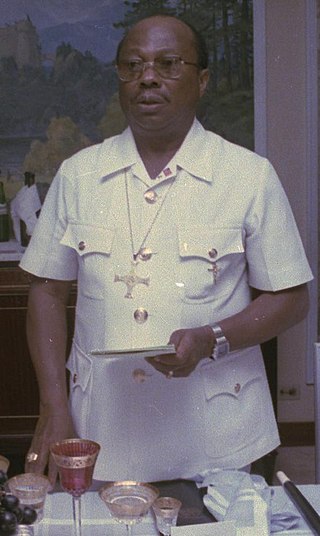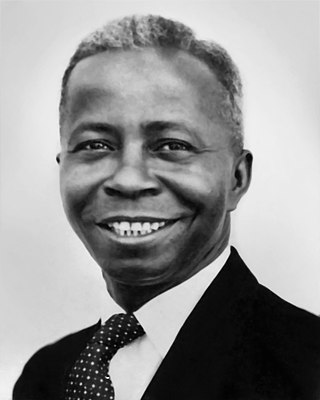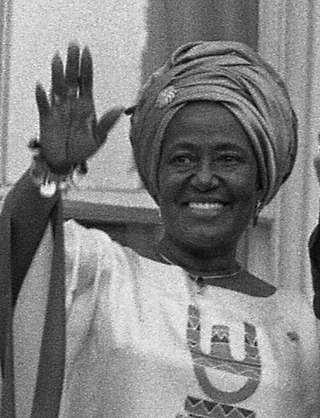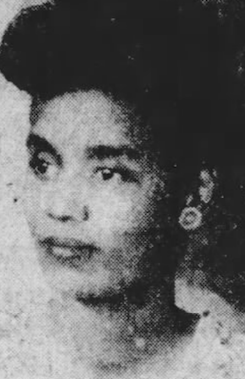Related Research Articles

Samuel Kanyon Doe was a Liberian politician who served as the 21st president of Liberia from 1986 to 1990. He ruled Liberia as Chairman of the People's Redemption Council (PRC) from 1980 to 1986 and then as president from 1986 to 1990.

The president of the Republic of Liberia is the head of state and government of Liberia. The president serves as the leader of the executive branch and as commander-in-chief of the Armed Forces of Liberia.

William Richard Tolbert Jr. was a Liberian politician who served as the 20th president of Liberia from 1971 until his assassination in 1980.

The People's Redemption Council (PRC) was a governmental body that ruled Liberia during the early 1980s. It was established after the 1980 Liberian coup d'état wherein Samuel Doe seized power on 12 April 1980. The Council, with Doe as its chairman, promised a complete overhaul of Liberia's society, economy, and political system and the replacement of the corruption of previous regimes with respect for the rights of the Liberian people. The PRC had 17 founding members and was later expanded to 28. The PRC initially functioned as the executive and legislative body in Doe's government. However, over time Doe consolidated power as a central executive. In 1984, the PRC was dissolved and replaced by the Interim National Assembly.
Thomas Gankama-Quiwonkpa was a Liberian military officer who was a Commanding General of the Armed Forces of Liberia (AFL).

General elections were held in Liberia on 15 October 1985. They were the first elections since the 12 April 1980 military coup that brought Samuel Doe to power. During 1984, a new draft constitutional was approved in a referendum, which provided for a 58-member civilian and military Interim National Assembly, headed by Samuel Doe as president. After a ban on political parties was lifted, four parties – Doe's National Democratic Party (NDP), the Liberian Action Party, the Unity Party and the Liberia Unification Party – contested the elections.
Gabriel Bacchus Matthews was a Liberian politician. He is considered one of the leaders in developing a multi-party system in Liberia, long dominated by the True Whig Party. He founded the Progressive Alliance of Liberia (PAL) in 1975, the first active opposition party since the demise of the Republican Party.

The Catholic Church in Liberia is part of the worldwide Catholic Church, under the spiritual leadership of the Pope in Rome.

Charles Cecil Dennis Jr was a Liberian political figure who served as Minister of Foreign Affairs under President William Tolbert from 1973 until the 1980 Liberian coup d'état led by Samuel Doe. Along with 11 other current and former members of the Liberian government, he was tried by a military tribunal and executed by firing squad ten days after the coup.
Joshua Milton Blahyi, better known by his nom de guerre General Butt Naked, is a Liberian evangelical preacher, writer and former warlord best known for his actions during the First Liberian Civil War. During the conflict, Blahyi led a group of soldiers which fought on the side of anti-rebel group United Liberation Movement of Liberia for Democracy (ULIMO) before converting to Christianity and becoming a pastor in 1996.
Thomas Weh Syen was a Liberian soldier and politician. He was a leading member of the group of enlisted men that overthrow the country's government in an April 1980 military coup d'état, and accordingly, he became one of the leaders of the new military junta, the People's Redemption Council. In the wake of the coup d'état, he took the title of major general in the Armed Forces of Liberia and became the co-chairman of the PRC; as a result, he was the immediate deputy of Commander-in-Chief Samuel Doe and the Vice Head of State.
Frank Emmanuel Tolbert was a Liberian politician and brother of President William R. Tolbert, Jr. The oldest son of William R. Tolbert Sr., national chairman of the ruling True Whig Party, he grew up in Bensonville, attended Zion Praise Baptist Church, graduated from Liberia College, and became involved in politics relatively early in life. As his family became more and more closely connected to the family of Supreme Court Justice William V.S. Tubman, Frank began to become prominent: when Tubman ran for President in 1943, he was rumoured to be Tubman's first choice for Vice President, although his younger brother William was eventually chosen, perhaps because of Frank's unpredictable moods and violent temper.

The 1980 Liberian coup d'état happened on April 12, 1980, when President William Tolbert was overthrown and murdered in a violent coup. The coup was staged by an indigenous Liberian faction of the Armed Forces of Liberia (AFL) under the command of Master Sergeant Samuel Doe. Following a period of transition, Doe ruled Liberia throughout the 1980s until his murder in 1990 during the First Liberian Civil War.

Edison Reginald Townsend was a Liberian journalist and statesman known for the establishment of Liberia's Information Services. He served as Secretary of Information and Cultural Affairs under President William Tubman, and as Minister of State for Presidential Affairs under President William Tolbert. In 1979 he was elected National Chairman of the True Whig Party. Following the 1980 Liberian coup d'état of President Tolbert on April 12, 1980, he and several other members of the Tolbert administration were put on trial and without due process executed by firing squad on April 22, 1980.

Americo-Liberian people, are a Liberian ethnic group of African American, Afro-Caribbean, and liberated Africans. Americo-Liberians trace their ancestry to free-born and formerly enslaved African Americans who emigrated in the 19th century to become the founders of the state of Liberia. They identified themselves as Americo-Liberians.

Liberia–Soviet relations were the bilateral relations between Liberia and Soviet Union. Contacts between the two countries were sporadic during the 1950s and 1960s, improved during the 1970s but became frosty in the 1980s.

Victoria Anna David Tolbert was the First Lady of Liberia from 1971 to 1980.

Israel-Liberia relations refer to the bilateral relations between the State of Israel and the Republic of Liberia. Liberia was one of the United Nations member states to vote in favor of establishing a Jewish state in Palestine in 1947. Israel and Liberia established relations in the late 1950s. The administration of William Tolbert severed ties with the Israeli government in 1973 in response to the Yom Kippur War, but they were re-established in 1983 by Samuel Doe, who succeeded Tolbert via coup.
Events in the year 1980 in Liberia.

Vivienne E. Newton Gray was an American educator and social worker. She was a Methodist missionary teacher in Liberia from 1948 to 1974. She was also an administrator at Wiley College in Texas.
References
- ↑ Ethnic Tensions in Liberia's National Identity Crisis: Problems and ... Emmanuel Dolo - 2007 - - Page 26
- ↑ Walker, Wanda (1977-10-30). "From Boy Carpenter to Vice President". The Marshall News Messenger. p. 21. Retrieved 2024-02-22– via Newspapers.com.
- ↑ "Rev. Davis Succeeds Warner". The Sunday People 1980-05-18: 1/4.
- ↑ "Tolbert's Aide in U.S." (PDF). The New York Times . April 13, 1980. Retrieved October 21, 2011.
- ↑ Methodists Prepare to Quit Liberia As Their Bishop Challenges Regime New York Times May 1, 1980
- ↑ "Methodists to Elect New Bishop". The Sunday People 1980-11-30: 8.
- ↑ "Bishop Warner Ousted". The Sunday People 1980-12-07: 1/8.
- ↑ "Clemency for Warner". Sunday Express 1984-07-29: 8.
